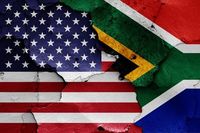JOHANNESBURG, South Africa — In a historic move, the U.S. government has officially granted refugee status to 54 Afrikaans South Africans, marking the first time this group has been accepted under a new humanitarian policy. These white descendants of mainly Dutch colonizers are expected to arrive in the United States on Monday, May 12, 2025, following an executive order signed by President Donald Trump earlier this year.
The refugees will be arriving via a charter flight arranged by U.S. authorities, aiming for Dulles Airport near Washington, D.C. However, if logistical issues arise, they may be rerouted on commercial flights. According to sources familiar with the matter, a press conference is scheduled for their arrival, where high-level officials from the Departments of State and Homeland Security will be present to welcome them.
This initiative stems from an executive order signed by Trump on February 7, 2025, which prioritizes humanitarian relief for Afrikaners in South Africa who have been identified as victims of unjust racial discrimination. The order also included a cut in aid to South Africa, a move that has stirred controversy.
"The Secretary of State and the Secretary of Homeland Security shall take appropriate steps, consistent with law, to prioritize humanitarian relief, including admission and resettlement through the United States Refugee Admissions Program, for Afrikaners in South Africa who are victims of unjust racial discrimination," the executive order states.
States across the U.S. have already agreed to accept the new arrivals, including Colorado, Massachusetts, Michigan, Minnesota, Washington, West Virginia, California, Idaho, Montana, North Carolina, Nevada, and New York. Many of the refugees have family ties in the U.S., which may facilitate their integration into American society.
The expedited process of granting refugee status to this group has raised eyebrows, as it is uncommon for refugees to be welcomed at the airport by U.S. dignitaries. The Afrikaners have received P1 refugee status, which is typically reserved for individual cases referred by designated entities based on their circumstances and apparent need for resettlement.
Trump, along with his South African-born adviser Elon Musk and Secretary of State Marco Rubio, has been vocal about the alleged persecution that Afrikaners face in South Africa. Trump has accused the South African government of "doing some terrible things" and claims they are confiscating land from Afrikaners. This allegation comes in the wake of a new land reform bill passed by the South African government earlier this year, which includes a clause for "expropriation without compensation." However, officials state that this clause will only be used in rare instances.
In response to Trump's accusations, South Africa's Department of International Relations issued a statement in February, calling it ironic that the U.S. would offer refugee status to a group that remains among the most economically privileged in the country. The statement highlighted the plight of vulnerable individuals in the U.S. who are being deported and denied asylum despite facing real hardship.
As the U.S. prepares for the arrival of these Afrikaners, the broader implications of this refugee policy are being scrutinized. Critics argue that prioritizing this group overlooks the needs of other refugees from more dire situations around the world. The rapid processing of their applications contrasts sharply with the lengthy procedures that many refugees typically endure.
The decision to accept these Afrikaners has sparked a debate about race, privilege, and the nature of asylum in the U.S. While some see it as a necessary humanitarian gesture, others raise concerns about the message it sends regarding U.S. immigration policy and its commitment to helping those in need.
As the clock ticks down to their arrival, many are left to wonder what the future holds for these new refugees. Will they find the safety and opportunity they seek in the U.S., or will they face new challenges in a foreign land? For now, the world watches closely as this unprecedented move unfolds.




